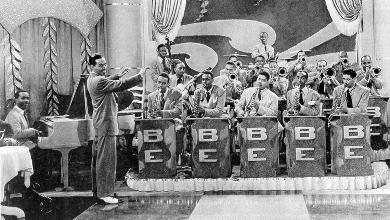Bebop Story 007 - Billy Eckstine And His Orchestra (1944)
Bebop Story 007 - Billy Eckstine And His Orchestra (1944)

01. Blue'n Boogie (Theme) [01:26] 02. Blowin' The Blues Away [01:58] 03. 'Deed I Do [02:39] 04. I Wanna Talk About You [03:18] 05. Blue'n Boogie (Theme) 1 [00:45] 06. Blue'n Boogie (Theme) 2 [00:47] 07. Together [04:00] 08. Mean To Me [04:26] 09. Without A Song [04:15] 10. Mr. Chips [03:00] 11. Blue 'n' Boogie (Theme) 3 [00:55] 12. Blue 'n' Boogie (Theme) 4 [01:21] 13. Air Mail Special [03:51] 14. Don't Blame Me [03:33] 15. If That's The Way You Feel [03:42] 16. Blue 'n' Boogie (Theme) 5 [01:13] 17. Blue 'n' Boogie (Theme) 6 [01:11] 18. Opus X [02:38] 19. Love Me Or Leave Me [04:25] 20. One O'Clock Jump [01:38] 21. Lonesome Lover Blues [02:47] 22. A Cottage For Sale [02:46] 23. I Love The Rhythm In A Riff [02:48] 24. Last Night [02:59] Alto Saxophone – Bill Frazier, Albert "Budd" Johnson, Jimmy Powell, John Cobbs, John Jackson, Sonny Stitt Baritone Saxophone – Leo Parker, Elman "Rudy" Rutherford, Teddy Cypron Bass – Oscar Pettiford, Tommy Potter Drums – Art Blakey , Rossiere "Shadow" Wilson Guitar – Connie Wainwright Piano – Clyde Hart, John Malachi, Richard Ellington Tenor Saxophone – Arthur Sammons, Dexter Gordon , Gene Ammons ,Thomas Crump, Wardell Gray Trombone – Alfred "Chippy" Outcalt, Claude Jones, Gerald Valentine, Howard Scott, Taswell Baird, Trummy Young, Walter Knox Trombone [Valve Trombone] – Billy Eckstine Trumpet – Al Killian, Dizzy Gillespie, Fats Navarro, Freddie Webster, Gail Brockman, Marion "Boonie" Hazel, Raymond Orr, Maurice "Shorty" McConnell Vocals, Conductor – Billy Eckstine
One of the most distinctive of all ballad singers, Eckstine was both a pivotal figure in the history of jazz (because of his commitment to bebop) and the first black singer to achieve lasting success in the pop mainstream. After winning a talent contest in 1930 by imitating Cab Calloway, Eckstine sang briefly with Tommy Myles’ band, before returning to college. On the recommendation of composer and tenor saxophonist Buddy Johnson he joined Earl Hines’ band in 1939 as singer and occasionally playing trumpet and in turn encouraged Hines to sign up Charlie Parker and Sarah Vaughan. Eckstine’s recordings with the band include ‘Stormy Monday Blues’ and his own ‘Jelly Jelly’. In 1943, he quit to go solo but in 1944 formed his own big band, a modern swing band committed almost exclusively to bebop, to the point where Eckstine’s stylized vocals regularly took second place to the playing of Dizzy Gillespie, Dexter Gordon, Art Blakey, Charlie Parker, Fats Navarro, Gene Ammons and Kenny Dorham, among others. The band was badly recorded and badly managed and in 1947 Eckstine folded it to go solo. However, the support Eckstine gave bop musicians at that time was crucial.
Even before folding his band, Eckstine had recorded solo to support it, scoring two million-sellers in 1945 with ‘Cottage for Sale’ and a revival of ‘Prisoner of Love’. Far more successful than his band recordings, though more mannered and pompously sung, these prefigured Eckstine’s future career. Where before black bands had played ballads, jazz and dance music, in the immediate post-war years they had to choose. Lacking an interest in the blues and frustrated by the failure of his big band, Eckstine, at first reluctantly, turned to ballads. Henceforth his successes would be in the pop charts.
In 1947, he was one of the first signings to the newly established MGM Records and had immediate hits with revivals of ‘Everything I Have Is Yours’ (1947), Richard Rodgers’ and Lorenz Hart’s ‘Blue Moon’ (1948), and Duke Ellington’s, Irving Mills and Juan Tizol’s ‘Caravan’ (1949). He had further success in 1950 with Victor Young’s theme song to ‘My Foolish Heart’ and a revival of the 1931 Bing Crosby hit, ‘I Apologize’. However, unlike Nat ‘King’ Cole who followed him into the pop charts, Eckstine’s singing, especially his exaggerated vibrato, sounded increasingly mannered and he was unable to sustain his recording success throughout the decade. His best record of the fifties was the thrilling duet with Sarah Vaughan, ‘Passing Strangers’, a minor hit in 1957.
Eckstine later concentrated on live appearances, regularly crossing the world, and recorded only intermittently. In 1967, he briefly joined Motown and in 1981 recorded the impressive ‘Something More’. ---vervemusicgroup.com
download: uploaded yandex 4shared mediafire solidfiles mega zalivalka filecloudio anonfiles oboom
Last Updated (Thursday, 31 July 2014 13:32)








